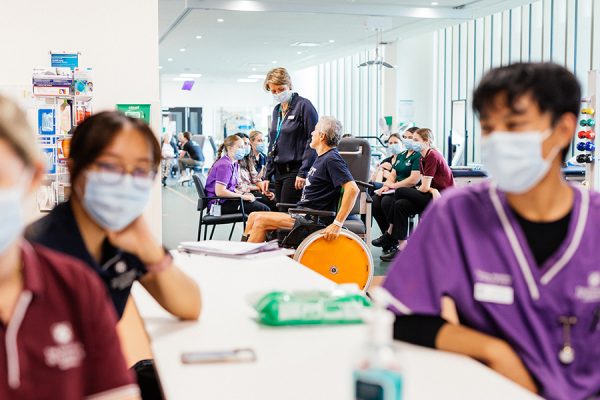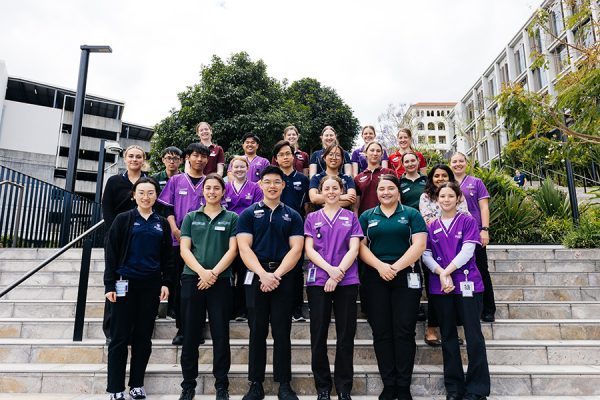Alliance activities
STARS Education and Research Alliance
The STARS Education and Research Alliance drives and supports the integration of research, education and clinical practice at STARS. Read more about the Alliance activities in the sections below.
In November 2021 to January 2022, the Alliance conducted a survey of STARS staff learning needs. The survey explored staff self-reported levels of individual research skills and experience, barriers and motivators to research participation, and perceived skill levels in Quality Improvement. A total of 89 staff across STARS participated in the survey. This included respondents from clinical backgrounds (Allied Health 37%, Medical 17% and, Nursing 28%), with the remaining 16% from Patient Services and Facility Support Services. For a copy of the report, please please refer to the Safety and Quality webpage (available from a Queensland Health computer only) on the STARS internal (QHEPS) website or contact the Alliance Manager on susan.sullivan@uq.edu.au or STARS_EducationandResearch@health.qld.gov.au.
Collaborative practice refers to multiple health workers from different professional backgrounds work together with patients, families, carers and communities to deliver the highest quality of care (WHO, 2010). STARS strives to be a leader and established research centre for interprofessional practice and education. We are committed to developing interprofessional practice capability with programs designed for our workforce, our educators and our students. Developing interprofessional capability means understanding the specific needs of teams working in our service, and the needs of our patients and their family. We focus on developing customised solutions to develop our interprofessional collaborative teamwork.
Spotlight on STARS projects
The STARS Research Portfolio contains details of all research projects that meet any of the following criteria:
TEG care for carpal tunnel release surgery
Full title: Technology-enhanced, group-based (TEG) model of hand therapy management versus usual care following carpal tunnel release (CTR) surgery: a feasibility and pilot randomised controlled trial.
Investigators: Emma Taylor, Trevor Russell, Emma Ballard, Haitham Tuffaha, Mohammadreza Amiri, Tamsin Mahoney, Semele Robinson (consumer), Ridzwan Namazie, Nadine Foster, Caroline Wegrzyn, Emmah Doig
- Research led by STARS clinician Emma Taylor and mentored by OT conjoint Dr Emmah Doig. Research team included consumer, nursing, medical and AH professionals and academic researchers.
- 32 patients recruited: usual care (1:1 F2F appointments, paper-based home program) versus technology-enhanced, group-based (TEG) care: group-based F2F and telehealth follow up plus app-based home program.
- TEG hand therapy was feasible and acceptable to patients.
- TEG cost saving of $42 per participant
- Four conference presentations, paper in preparation
- Supported by HP Research Scheme (2023) grant
- Awarded one of the ‘best posters and pitches’ award at the QLD Health Research Excellence Showcase on 30th May 2025
This study has led to clinical practice change locally to enable sustained implementation of TEG including scheduling to accommodate booking of group sessions to meet demand, and to achieve service efficiencies, routine offering of telehealth for post-CTR review appointments in addition to in-person, and routine offer of the developed app-based home program in addition to a paper-based option depending on patient preference. Other health services have contacted the research team to explore implementation of aspects into their health services, including Prince Charles Hospital, Gold Coast Hospital, QEII Hospital, PA Hospital and Roma Hospital.
CHAT at STARS
Full title: Implementation of the Comprehensive, High-dose Aphasia Treatment (CHAT) at the Surgical Treatment and Rehabilitation Service.
Investigators: Jade Dignam, David Copland, Kate O’Brien, Kirstine Shrubsole, Kylie Short, Emma O’Neill, Katherine Roxas Penni Burfein, Jessica Campbell, Adele Coleman, Caitlin Fraser, Jessica Halpin, Annie Hill, Renee Stuckey, Hannah Wedley.
Intensive, Comprehensive Aphasia Programs (ICAPs) are considered the gold-standard of aphasia rehabilitation, however, they are rarely realised in clinical practice. The Comprehensive, High-dose Aphasia Treatment (CHAT) program is a modified-ICAP, incorporating 50 hours of evidence-based, goal-directed aphasia therapy delivered over 8 weeks. In a clinical-research collaboration, the Surgical, Treatment and Rehabilitation Service (STARS) partnered with the Queensland Aphasia Research Centre (QARC), to evaluate the clinical implementation and effectiveness of CHAT when delivered as part of the STARS speech pathology service.
Thirty-five people were trained in the delivery of CHAT at STARS (including speech pathologists, students and allied health assistants). Fourteen cohorts of CHAT were delivered by the STARS speech pathology service as part of the hybrid clinical implementation and effectiveness study. Sixty-eight patients with post-stroke aphasia participated in CHAT. A high dose of CHAT therapy was achieved (mean = 47 hours), with a 97% program completion rate. CHAT resulted in positive gains in participants’ language impairment, functional communication, communication-confidence and quality of life immediately post-CHAT (p < .05) and therapy gains were maintained at 3-month follow-up.
The feasible and acceptable implementation of CHAT has resulted in service-level changes within Metro North Health Service, including the successful translation of the clinical-research service to usual care within the STARS Day Rehabilitation service. CHAT is the first program of its kind to be embedded within an Australian healthcare service and this outcome enables access to high-value, person-centred care.
This partnership has also resulted in upskilling of the allied health workforce, with a multidisciplinary CHAT case conference, interprofessional group therapy, and 35 allied health professionals trained in the delivery of CHAT at STARS. The CHAT partnership has won multiple awards, including the Queensland Health Research Excellence Award for embracing research and innovation. CHAT is now being implemented at sites in QLD, South Australia, and NSW as part of a NHMRC Partnership Grant.
- Project includes STARS patients (or their data/tissue)
- Data collection occurs in the STARS facility (including UQ-leased space on Level 1 & 7 of STARS)
- STARS resources are contributed to the project (eg data, equipment, staff in-kind time)
The STARS Research Portfolio includes over 130 projects, with over 70 active projects (currently in data collection, analysis, or dissemination) and many projects in development.
We encourage any individual (whether employed by UQ or Metro North) to include the Alliance affiliation on their outputs, especially where it involves research collaboration with STARS, or it involves STARS patients or STARS facilities. This will help us to promote the important partnership between UQ and Metro North and promote STARS as a research-active hospital. For more information on affiliations, please refer to this guide.
In 2021 we ensured that CCI is a core part of the Alliance’s Strategic Plan, and in early 2022, we began the development of the STARS Research Consumer Group, to better ensure the vision of ‘no research about us, without us’, providing opportunities for consumers and community members to get involved in all stages of the research cycle, and to shape the education of tomorrow’s healthcare professionals. For more information see the STARS Research Consumer Group webpage or contact STARS_ResearchConsumer@health.qld.gov.au.
Thinktanks provide a stimulating and supportive forum for clinical researchers interested in progressing research ideas. The think-tanks are an opportunity to discuss and share ideas to develop and strengthen study protocols, through in-depth discussion, feedback and constructive feedback. Learn more about collaborating with STARS for a research project.
Read more about Clinical Research Think-Tanks.
Critical Appraisal Topic (CAT) group provides the opportunity to collaboratively engage clinicians, researchers, and health librarians in asking and answering important clinical questions to ensure clinical practice is based on the best available evidence. CAT group provides an environment for share knowledge. To date, we have conducted eight Critically Appraised Topic (CAT) Groups involving conjoints, UQ health librarians, STARS clinicians and consumers. Topics have included: lens for cataract surgery, accelerated arthroplasty, and falls in inpatient rehabilitation. See our resources section for the finalised reports from CAT group. To propose a future CAT group topic, please email STARS_EducationandResearch@health.qld.gov.au.
Watch a YouTube video created by UQ librarians for a short introduction on developing questions for CATs.
Read more about the Critically Appraised Topics (CATS) process.
STARS provides clinical placements within medicine, nursing and allied health for over 200 students each year. Our students are valued members of our interprofessional teams. Many of our students on graduating take new graduate positions here at STARS. Any queries or issues around students in STARS, educational activities/initiatives should be directed to the STARS Student and Workforce Development Committee, chaired by Karina O’Leary and Nathan Costin. Email the committee secretary on STARS_EducationandResearch@health.qld.gov.au
Undergraduate student placements for Allied Health are managed by the Allied Health Clinical Education Support Officer, email STARS_AHCESO@health.qld.gov.au).
For nursing placements, contact the Nurse Student Educator email STARSNursingClinicalPlacements@health.qld.gov.au.
Queensland Health has information for students.
For information about non-clinical placement students, contact the Alliance Manager on susan.sullivan@uq.edu.au or STARS_EducationandResearch@health.qld.gov.au.

UQ Students in the STARS Ability Centre

UQ Students on the Spanish steps
